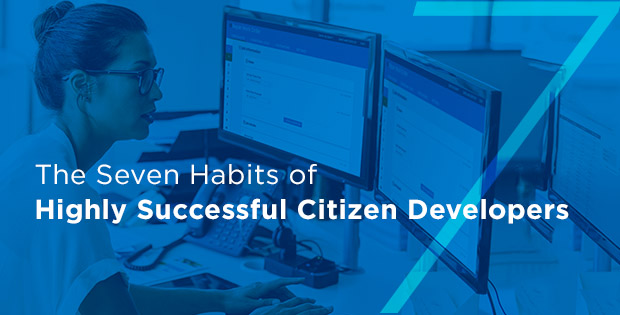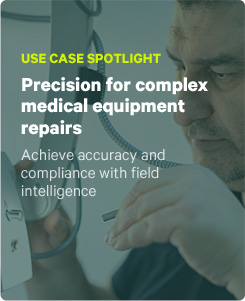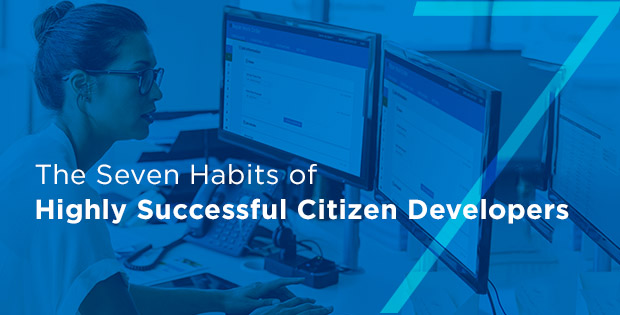
ProntoForms’ virtual user conference EMPOWER’20 is just around the corner. It’s an understatement to say we’re BEYOND excited to offer a dynamic conference designed to provide everyone from directors to citizen developers with valuable tools and knowledge for field service success.
We’ve been feeling a bit nostalgic lately thinking about last year’s conference. While connecting in a virtual setting might be different from last year, we’re confident that we’ve built an event that will deliver the goods.
After digging through the EMPOWER’19 vaults, we thought it would be interesting to share a recap of a presentation delivered by Russ Halliday, our VP of Product. This session titled, “Fostering Your Citizen Development Program” gave a nod to Stephen Covey’s famous self-improvement book “The Seven Habits of Highly Effective People.”
Here’s a breakdown of Russ’ talk titled, “The Seven Habits of Highly Successful Citizen Developers.”
Habit #1 – Know the business
Russ highlighted that to understand your business, it’s essential to know what makes your part of the organization successful. Making this habit stick boils down to being proactive and adopting a mindset of aiming to move your business’ goals forward at every opportunity and advance on your citizen development goals.
It’s suggested you keep tabs on:
- Who your business’ stakeholders are and what they’re trying to accomplish.
- The most important data you wish to collect, who needs to access this information, and where it should be housed so it’s easily accessed.
- How you know when things are going well and not so well.
- How the tools you provide to the field support your staff to achieve company goals.
- Ways to optimize what’s being done in the field that can help drive costs down.
Habit #2 – Know IT
To be successful as a citizen developer, Russ noted that it’s important to have a deep understanding of your IT department’s needs as taking on the app developer role in your company means that you’re acting as a proxy for IT.
Since the IT department is tasked with assessing technology solutions, they often ask the following questions during an evaluation:
- Will the solution scale?
- Is it secure?
- Who from the IT organization needs to provide support for the solution? Will these support requests compete with the millions of other initiatives being developed within the business?
- How can a worthy solution be leveraged in other parts of the business?
Habit #3 – Know the users
Putting yourself in the shoes of the people who are going to use the tools you create day in and day out sounds simple and obvious enough, but it’s surprisingly difficult to do. Several reasons Russ considers this a potential challenge for those working in citizen development are:
- You’ll encounter an unending amount of opinions from colleagues on how things should be accomplished.
- You’ll face demographic challenges; for example, some people are part of the ‘Snapchat generation,’ while others are terrified or confused by tech and gadgets
- Not only are there differences in attitudes towards technology adoption between the people using the tools, but between a citizen developer and those who are in the field.
He shared that it takes time and patience to build empathy for those who may be resistant to or have difficulty using software, but the dividends that come from having a happy user base that can perform work effectively and efficiently pays off. Customer satisfaction will increase, employees will be happier and feel included, and operations will generate more value. We can’t forget how good it feels for a citizen developer to positively impact the lives of field service employees while increasing revenue and solving problems.
Habit #4 – Become outcome-oriented
Russ explained that highly successful citizen developers are proactive and seek to understand the business by taking a 360-degree view. The problem is there’s so much information to sort through and prioritize. It’s easy to fall into the trap of analyzing everything in one big set, which only makes things more complicated than necessary. Picking a few key objectives that are of most value to your stakeholders and prioritizing these items will net some quick wins. You’ll boost your confidence and demonstrate progress. As your credibility grows, the understanding and trust in your role will also increase.
“Think big, but start small” was advocated by Russ as a way to become more outcome-oriented. The caveat is to make sure that you’re doing something that can produce a measurable result to ensure you’re achieving the desired outcome.
Habit #5 – Remain agile
Agile is a way of working through problems in small iterations, mostly because working with software is difficult, and unexpected issues often arise. Russ noted that using the agile methodology results in learning details along the way that help to build a better product than first imagined.
Russ shared that to remain agile you must know how to manage people through change. Every time you put a new or different tool into someone’s hands, you’re changing the way they work – and, as we all know, people have varying tolerance to high levels of change.
An excellent tool for your change management arsenal is to produce in small increments. Adjusting to new ways of work or tools by taking in small bite-sized pieces is easier for people to acclimatize to.
Ultimately, don’t get caught up in perfection. It’s less important to launch a fully-baked solution and it’s more important that it’s at least a noticeable step in the right direction. You’ll be ready to get feedback from employees in the field, and business and IT stakeholders and make changes as you iterate.
Habit #6 – Relentlessly pursue continuous improvement
Another hallmark of a great citizen developer is the constant need to improve and innovate.
Being in-between IT and business units puts you in a unique and powerful role for effecting change and becoming an innovation center in the organization. There are three ways you can work towards demonstrating long-term value, driving costs down while driving engagement, customer satisfaction, and operational targets, namely:
- Capture more complete data.
- Improve the field user’s experience.
- Drive operational efficiency.
Russ told the story of his mentor who always used to say, “Every time you do something, treat it like it’s just practice for the next time you’re going to have to do it.” This perspective forces you to be analytical to help you be better prepared next time around. Citizen developers want to be trying, testing, learning, and improving consistently. By knowing your stakeholders and being agile and proactive, the opportunity to achieve significant outcomes is high.
Habit #7 – Serve your stakeholders
Russ concluded his session at EMPOWER’19 by sharing how citizen developers need to deliver exceptional customer service to their stakeholders. The rationale? Making stakeholders successful ultimately makes you successful in turn. He recommended the following actions:
- Listen for unmet needs and opportunities to try out new ideas.
- Examine where people are having the most difficulties with the tools you’ve created and engage them to come up with new and better solutions.
- Be realistic about not accomplishing all that you or your stakeholders want to achieve.
The session ended with Russ suggesting citizen developers be clear about what they’re working on and what they need to wait on. Leveraging your position in the company as a hub to examine what’s being done and then relating this back to the big picture. Doing this means you’re empowered to be a meaningful agent of change.
For those who have joined the citizen development movement, you can expect the same great content at this year’s edition of EMPOWER. Don’t miss your chance to learn new skills, gain knowledge into what other field service pros are doing in their organizations, and network with peers and industry experts. Reserve your spot today! Your virtual ticket includes free access to the video recordings after the event, so even if you can only make it to part of the live conference, we’ve got you covered.




